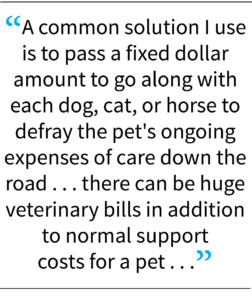Your Estate … with James Ward Consider what you should do with your pets after you are gone
Sometimes clients have no major concern and figure that everything will be easy
![]()
By James Ward

James Ward
In a very tragic case I had, the closest family members hadn’t been allowed to visit for years, and had only communicated with the elder by phone. When the elder’s partner died and family members had to get involved to help, they realized things had gone terribly wrong in recent years.
 In addition to becoming hoarders, cats had taken over the lives of the people. There were several cats inside the house and in the yard, along with several deceased cats that had been buried in the backyard, and several more deceased cats that were wrapped and being stored in the large freezer in the garage.
In addition to becoming hoarders, cats had taken over the lives of the people. There were several cats inside the house and in the yard, along with several deceased cats that had been buried in the backyard, and several more deceased cats that were wrapped and being stored in the large freezer in the garage.
It was a difficult case, to say the least. The brother doing most of the work to sort things out spent a lot of time crying with me in my office and on the phone. He couldn’t believe that things had gone so wrong. He was totally overwhelmed by what he faced in trying to make care arrangements for the elder, and upset with himself that he hadn’t been more forceful in wanting to visit his sibling.
In another case, the couple lived in a suburban home with no pets, but the wife previously had horses when they lived in a different area, and she had sent her three horses to retirement farms in different states. The instructions in the trust were to hold all assets in the trust to pay for the retirement farms for the horses.
Other than paying for the horse retirement farms, nothing was to be distributed from the trust until after the last horse had died, and that was the plan even if it meant that there was nothing left in the trust when the last horse died.
Sometimes clients have no major concern and figure that everything will be easy with their family members taking care of any remaining pets, but sometimes clients want to make special arrangements for their pets.

 A common solution I use is to pass a fixed dollar amount to go along with each dog, cat, or horse to defray the pet’s ongoing expenses of care down the road. As people with pets are well aware, there can be huge veterinary bills in addition to normal support costs for a pet, and we generally set aside much more for a horse than for a smaller pet.
A common solution I use is to pass a fixed dollar amount to go along with each dog, cat, or horse to defray the pet’s ongoing expenses of care down the road. As people with pets are well aware, there can be huge veterinary bills in addition to normal support costs for a pet, and we generally set aside much more for a horse than for a smaller pet.
In one case, my client was a writer who I had known for years, and she came in with 25 or 30 yellow sticky notes attached to her draft copy of the trust. My first comment was that we weren’t going to reinvent the wheel, but that I would certainly go tab by tab and explain everything to her.
When we got beyond the specific gifts to family and friends, and started on the residuary section, she had a big note to the Trustee about how her pets had provided her with love and affection during the years. I asked about what wording she wanted to include besides the note, and she said that she just wanted the Trustee to know, without any doubt, that she “loved her pets, and that the Trustee would burn in hell if she didn’t properly take care of her pets.”
It was time for a discussion to clarify her wishes.
Me: Do you want me to include the “burn in hell” language?
Client: No, that’s okay, Jim. (Big sigh from her.) Just let them know that I really love my pets, and that they have to take care of them.
